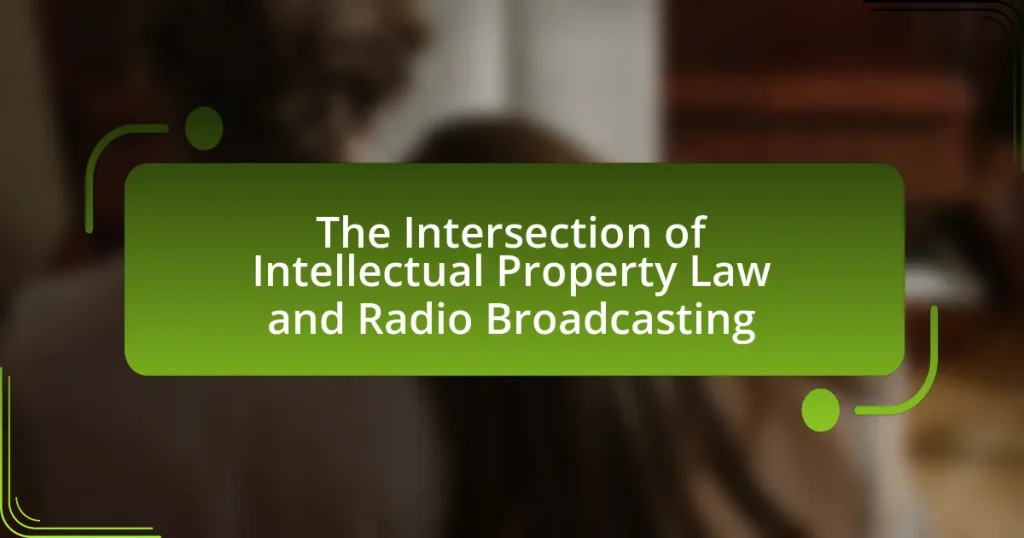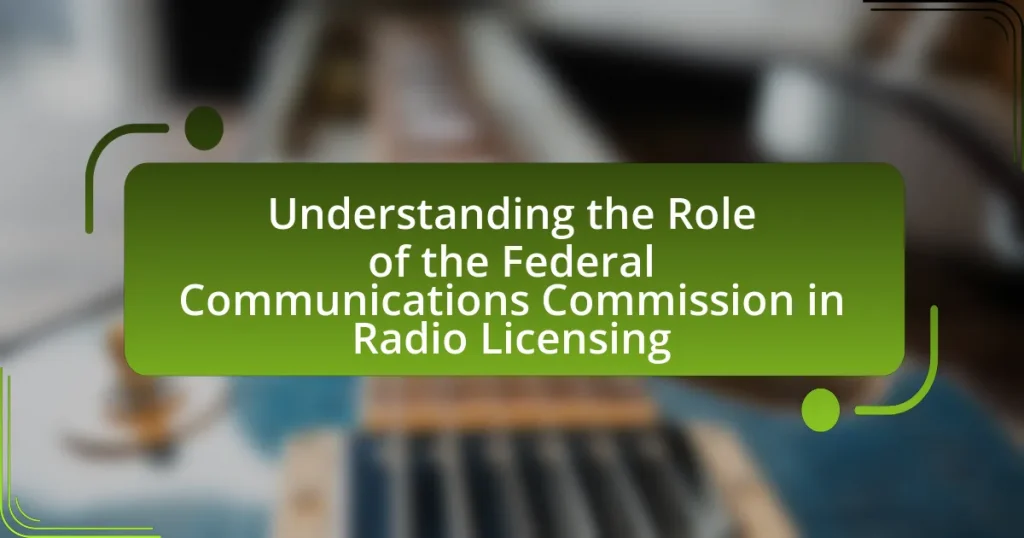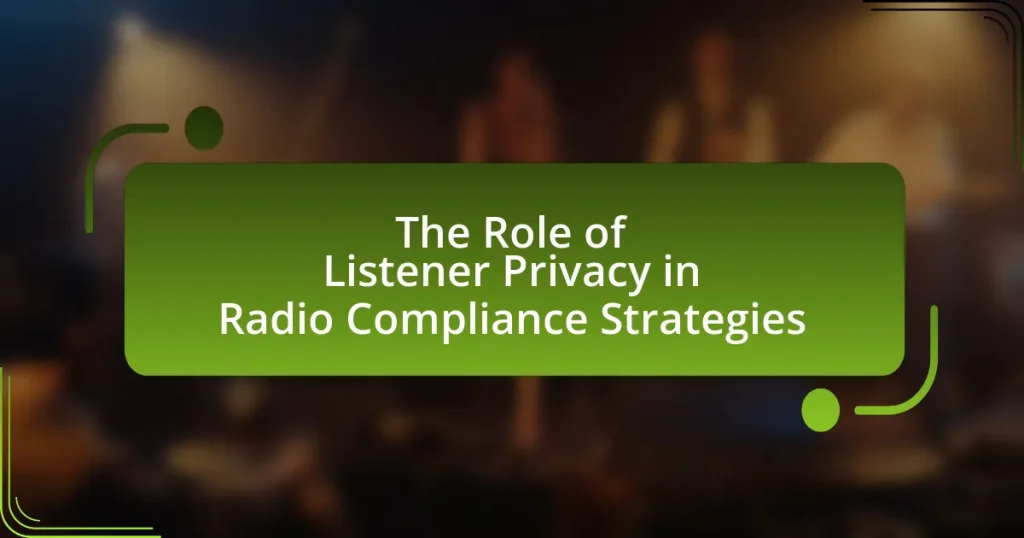The article focuses on the essential practices for radio stations to prepare for an FCC audit, which is a compliance review conducted by the Federal Communications Commission. It outlines the importance of these audits in maintaining broadcasting licenses and adhering to federal regulations, detailing the potential consequences of non-compliance, such as fines and license revocation. Key components of an FCC audit, including documentation requirements, technical compliance assessments, and operational practices, are discussed. Additionally, the article emphasizes best practices for preparation, including regular internal audits, staff training, and effective communication, to enhance compliance and operational efficiency.

What is an FCC Audit for Radio Stations?
An FCC audit for radio stations is a review conducted by the Federal Communications Commission to ensure compliance with regulations governing broadcasting. This audit assesses various aspects, including licensing, public file maintenance, and adherence to technical standards. The FCC’s authority to perform these audits stems from its mandate to regulate interstate and international communications, ensuring that radio stations operate within the legal framework established by the Communications Act of 1934.
Why are FCC Audits important for radio stations?
FCC audits are important for radio stations because they ensure compliance with federal regulations, which helps maintain broadcasting licenses. These audits assess adherence to technical standards, public service obligations, and financial reporting requirements. Non-compliance can lead to fines, license revocation, or other penalties, as evidenced by the FCC’s enforcement actions against stations that fail to meet these standards. Thus, regular audits not only safeguard a station’s operational legitimacy but also enhance its credibility and public trust.
What are the potential consequences of non-compliance?
The potential consequences of non-compliance with FCC regulations include significant financial penalties, loss of broadcasting licenses, and legal repercussions. For instance, the FCC can impose fines that range from thousands to millions of dollars depending on the severity of the violation. Additionally, non-compliance can lead to the revocation of a station’s license, which would prevent it from operating legally. Historical data shows that in 2020, the FCC issued over $1.5 million in fines for various compliance violations, underscoring the financial risks associated with non-compliance. Furthermore, repeated violations can result in more severe actions, including criminal charges against responsible individuals, thereby highlighting the critical importance of adhering to FCC standards.
How do FCC Audits impact station operations?
FCC audits significantly impact station operations by enforcing compliance with regulations, which can lead to operational adjustments and potential penalties. Stations must ensure adherence to technical standards, public file requirements, and programming obligations, as non-compliance can result in fines or license revocation. For instance, the FCC’s enforcement actions have historically included fines totaling millions of dollars for violations, emphasizing the importance of maintaining accurate records and operational practices. Consequently, stations often implement rigorous internal audits and staff training to mitigate risks associated with FCC scrutiny.
What are the key components of an FCC Audit?
The key components of an FCC Audit include compliance with regulations, documentation review, equipment inspection, and operational practices assessment. Compliance with regulations ensures that the radio station adheres to the rules set forth by the Federal Communications Commission, which is critical for maintaining broadcasting licenses. Documentation review involves examining records such as licenses, logs, and reports to verify that all required paperwork is accurate and up-to-date. Equipment inspection focuses on ensuring that all broadcasting equipment meets technical standards and operates correctly, which is essential for signal quality and regulatory adherence. Lastly, operational practices assessment evaluates the station’s adherence to established procedures and policies, ensuring that all staff are trained and that the station operates within legal and ethical guidelines. These components collectively ensure that a radio station remains compliant and can effectively respond to FCC audits.
What documentation is required for an FCC Audit?
For an FCC audit, the required documentation includes the station’s public inspection file, ownership information, and records of compliance with the FCC’s rules and regulations. The public inspection file must contain documents such as the station’s license, any applications for renewal, and records of any complaints received. Ownership information should detail the station’s structure and any changes in ownership. Compliance records must demonstrate adherence to operational standards, including emergency alert system tests and public service announcements. These documents are essential for verifying that the station operates within the legal framework established by the FCC.
How is technical compliance assessed during an audit?
Technical compliance during an audit is assessed through a systematic evaluation of a radio station’s adherence to regulatory standards set by the Federal Communications Commission (FCC). Auditors review documentation, operational procedures, and equipment specifications to ensure they meet FCC requirements, such as signal strength, frequency usage, and emergency alert systems. This assessment often includes on-site inspections and testing of transmission equipment to verify compliance with technical rules. For instance, the FCC mandates that radio stations maintain specific power levels and operational parameters, which are verified through direct measurement and comparison against established benchmarks.

How can radio stations prepare for an FCC Audit?
Radio stations can prepare for an FCC audit by conducting a thorough review of their compliance with FCC regulations, ensuring all required documentation is organized and accessible. This includes verifying that licenses are current, public inspection files are up to date, and that all operational practices align with FCC rules. Additionally, stations should implement regular internal audits to identify and rectify potential compliance issues before the official audit occurs. Historical data shows that proactive compliance measures significantly reduce the likelihood of violations during audits, as evidenced by the FCC’s enforcement actions which often target stations with documented lapses in compliance.
What steps should be taken to ensure compliance?
To ensure compliance with FCC regulations, radio stations should implement a systematic approach that includes regular audits, staff training, and documentation management. Regular audits help identify areas of non-compliance and allow for timely corrective actions. Staff training ensures that all employees understand FCC rules and operational procedures, which is crucial for maintaining compliance. Additionally, maintaining accurate and organized documentation, such as licenses, logs, and reports, is essential for demonstrating compliance during an FCC audit. These steps collectively contribute to a proactive compliance strategy, reducing the risk of violations and penalties.
How can stations conduct a self-assessment before the audit?
Stations can conduct a self-assessment before the audit by systematically reviewing their compliance with FCC regulations and internal policies. This process involves evaluating documentation, such as licenses, public files, and operational procedures, to ensure they meet the required standards. Additionally, stations should perform a checklist review that includes verifying the accuracy of their station logs, ensuring proper maintenance of equipment, and confirming that all required reports have been filed on time. This self-assessment helps identify any potential issues that could arise during the audit, allowing stations to address them proactively.
What resources are available for understanding FCC regulations?
The primary resources available for understanding FCC regulations include the official FCC website, which provides comprehensive information on rules, policies, and procedures. Additionally, the FCC publishes various documents such as the Code of Federal Regulations (CFR) Title 47, which outlines telecommunications regulations, and the FCC’s own reports and public notices that detail specific regulatory changes and guidelines. Industry associations like the National Association of Broadcasters (NAB) also offer resources, including webinars and publications, to help radio stations navigate FCC compliance. These resources are essential for ensuring adherence to regulations and preparing for audits.
What common mistakes should be avoided during preparation?
Common mistakes to avoid during preparation for an FCC audit include inadequate documentation, lack of staff training, and failure to conduct a self-assessment. Inadequate documentation can lead to non-compliance findings, as the FCC requires specific records to be maintained, such as public inspection files and EAS logs. Lack of staff training results in unprepared personnel who may not understand compliance requirements, which can hinder the audit process. Additionally, failing to conduct a self-assessment prevents radio stations from identifying and addressing potential issues before the audit, increasing the risk of penalties. These mistakes can significantly impact the outcome of the audit and the station’s operational integrity.
How can inadequate record-keeping affect the audit outcome?
Inadequate record-keeping can lead to negative audit outcomes by resulting in incomplete or inaccurate financial statements and compliance reports. This lack of reliable documentation can cause auditors to question the validity of the reported data, potentially leading to findings of non-compliance with FCC regulations. For instance, if a radio station fails to maintain proper logs of programming content or advertising, it may face penalties or sanctions during the audit process. Furthermore, the absence of clear records can hinder the auditor’s ability to verify transactions, increasing the risk of misstatements and financial discrepancies.
What are the risks of ignoring FCC guidelines?
Ignoring FCC guidelines poses significant risks, including potential fines, loss of broadcasting licenses, and legal repercussions. Non-compliance can lead to financial penalties that may reach up to $500,000 for serious violations, as established by the Communications Act. Additionally, radio stations may face increased scrutiny and audits from the FCC, which can disrupt operations and damage reputations. Failure to adhere to these guidelines can also result in the revocation of licenses, ultimately jeopardizing the station’s ability to operate legally.

What best practices should radio stations follow for FCC Audits?
Radio stations should maintain comprehensive documentation and ensure compliance with FCC regulations to prepare for FCC audits effectively. This includes keeping accurate records of all programming, public files, and technical operations, as well as ensuring that all licenses are current and properly displayed. Regular internal audits can help identify potential compliance issues before the FCC conducts its audit. Additionally, training staff on FCC rules and regulations is crucial, as it fosters a culture of compliance and awareness. By adhering to these practices, radio stations can demonstrate their commitment to regulatory standards and minimize the risk of penalties during audits.
How can effective communication improve audit readiness?
Effective communication enhances audit readiness by ensuring that all stakeholders are informed and aligned on compliance requirements and procedures. Clear communication facilitates the sharing of critical information, such as documentation and operational practices, which are essential for audits. For instance, regular updates and training sessions can help staff understand their roles in maintaining compliance, thereby reducing the risk of errors during the audit process. Studies show that organizations with strong communication practices experience fewer compliance issues, as they foster a culture of transparency and accountability.
What role does staff training play in compliance?
Staff training plays a crucial role in compliance by ensuring that employees understand and adhere to regulatory requirements. Effective training programs equip staff with the knowledge of relevant laws, policies, and procedures, which minimizes the risk of non-compliance. For instance, according to a study by the Compliance and Ethics Institute, organizations with comprehensive training programs experience 50% fewer compliance violations compared to those without such initiatives. This demonstrates that well-structured staff training not only enhances awareness but also fosters a culture of compliance within the organization.
How can stations stay updated on regulatory changes?
Stations can stay updated on regulatory changes by subscribing to industry newsletters, attending relevant conferences, and engaging with regulatory bodies directly. These methods provide timely information on new regulations and compliance requirements. For instance, organizations like the National Association of Broadcasters (NAB) regularly disseminate updates on FCC regulations, ensuring that stations are informed about any changes that may affect their operations. Additionally, participating in webinars and training sessions offered by industry experts can enhance understanding of regulatory landscapes, further aiding compliance efforts.
What are the benefits of thorough preparation for an FCC Audit?
Thorough preparation for an FCC audit ensures compliance with regulations, minimizing the risk of fines and penalties. By systematically reviewing documentation and operational practices, radio stations can identify and rectify potential issues before the audit occurs. This proactive approach not only enhances the likelihood of a favorable audit outcome but also fosters a culture of accountability and transparency within the organization. Furthermore, being well-prepared can streamline the audit process, saving time and resources, and allowing staff to focus on core operations rather than compliance issues.
How does preparation enhance operational efficiency?
Preparation enhances operational efficiency by ensuring that all necessary resources, processes, and protocols are in place before an operational task begins. This proactive approach minimizes errors, reduces downtime, and streamlines workflows, leading to faster and more effective execution of tasks. For instance, a study by the Project Management Institute found that organizations with high levels of project preparation experience a 20% increase in project success rates, demonstrating that thorough preparation directly correlates with improved operational outcomes.
What long-term advantages can compliance bring to a station?
Compliance can bring several long-term advantages to a station, including enhanced operational efficiency, reduced legal risks, and improved reputation. By adhering to FCC regulations, a station minimizes the likelihood of fines and penalties, which can be financially burdensome. For instance, stations that maintain compliance with licensing requirements and public file obligations are less likely to face costly audits or enforcement actions. Additionally, compliance fosters trust among listeners and advertisers, as it demonstrates a commitment to ethical broadcasting practices. This trust can lead to increased audience loyalty and potentially higher advertising revenues over time.
What practical tips can help radio stations succeed in FCC Audits?
Radio stations can succeed in FCC audits by maintaining accurate and up-to-date documentation, ensuring compliance with all FCC regulations, and conducting regular internal audits. Accurate documentation includes keeping logs of programming, public files, and any required reports, which helps demonstrate compliance during audits. Compliance with FCC regulations involves understanding and adhering to rules regarding licensing, content, and technical standards. Regular internal audits allow stations to identify and rectify potential issues before an official audit occurs, thereby reducing the risk of violations. These practices are essential for demonstrating accountability and transparency, which are critical factors in successful FCC audits.



